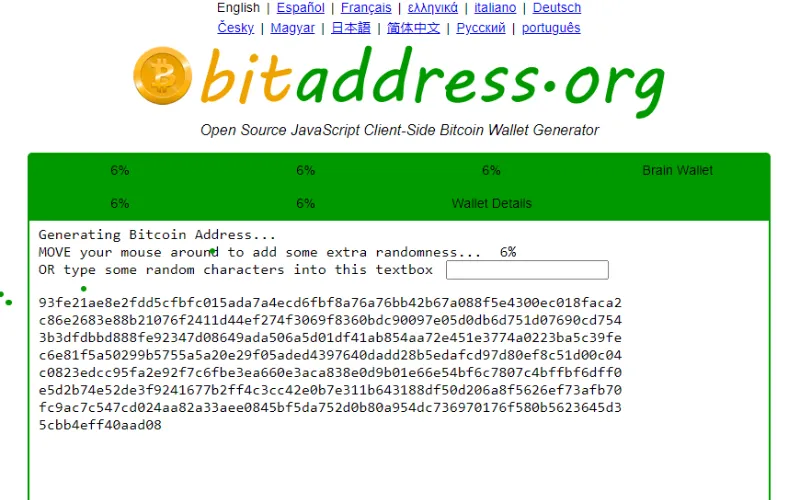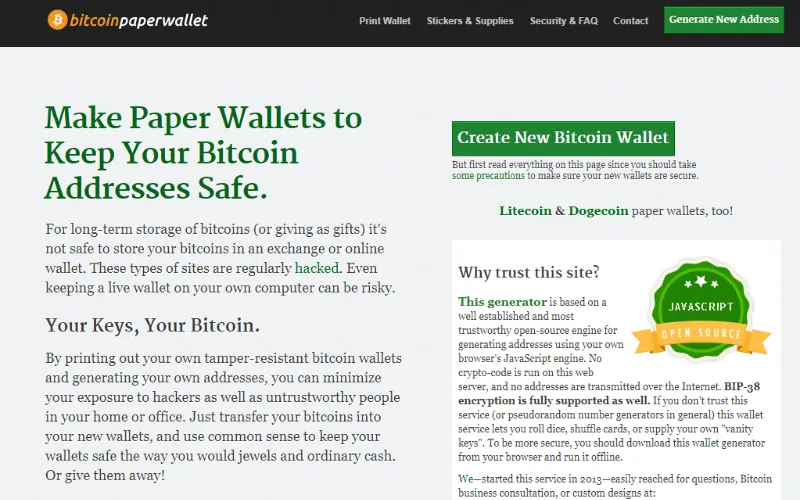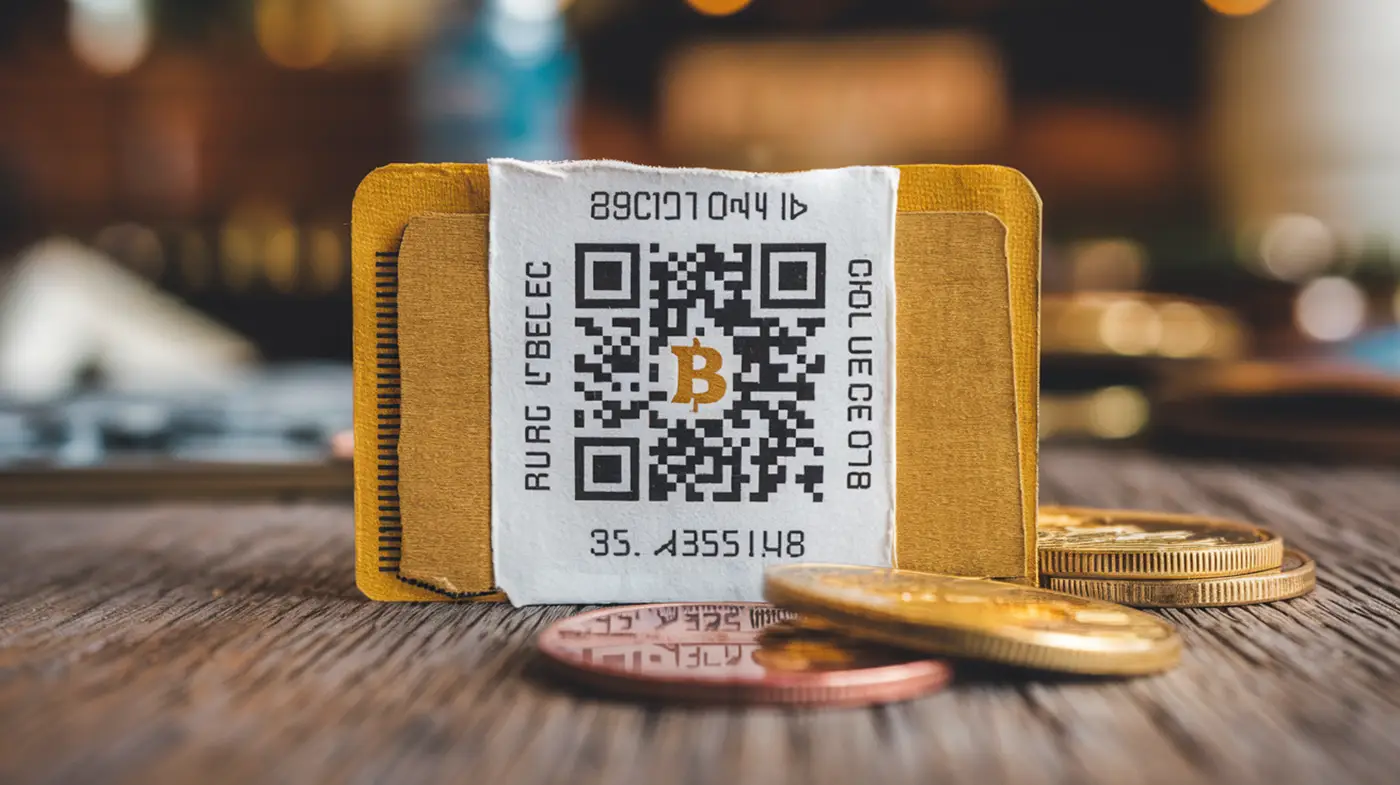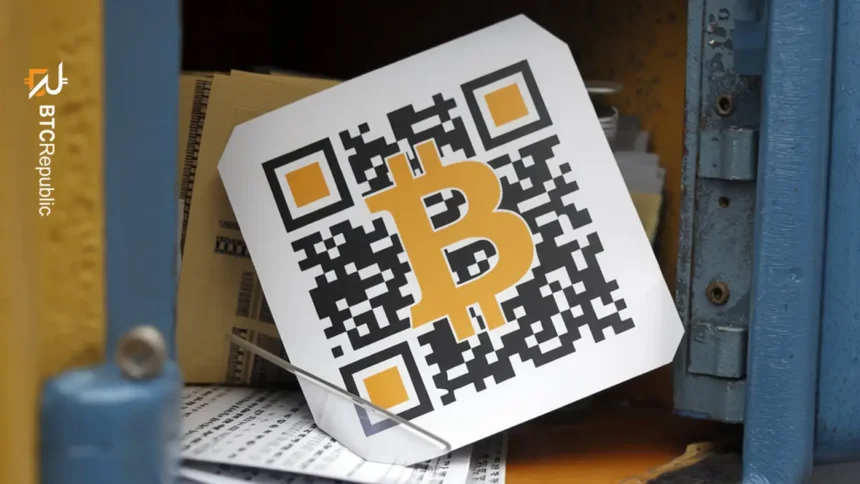In the world of Bitcoin and other cryptocurrencies, a Bitcoin wallet facilitates the storage, sending, and receiving of cryptos.
Imagine having lots of virtual currency but nowhere to store it. That is basically what your Bitcoin wallet seeks to address. But, Bitcoin wallets don’t fall from the sky, they have to be generated.
This leads to the concept of a Bitcoin wallet generator, which this beginner guide will discuss in the context of paper wallets.
- What Is A Paper Wallet?
- How A Bitcoin Wallet Generator Works
- Steps To Generator A Paper Wallet
- Bitcoin Paper Wallet Safety And Security Tips
- Keep It As Cold As Possible
- Update Your Software Regularly
- Use A Dedicated Device
- Have Backup Copies In Safe And Secure Locations
- Consider Using Laser Printers
- Protect Digital Copies With Encryption And Password-Protection
- Print And Dispose Of Paper Wallets Cautiously
- Conclusion
- FAQs
What Is A Paper Wallet?
A paper wallet is a piece of paper containing important information, such as your public and private keys.
The main reason for using physical paper is to safely, securely, and inexpensively store key information outside the Internet, enhancing peace of mind from cybersecurity challenges.
There are many ways you can generate your Bitcoin paper wallet. The easiest way is to manually write your keys, seed phrases, and addresses on paper with a pen.
However, manually writing many letters and numbers can be challenging for some people. Such people prefer to use a wallet generator app.
Luckily, several apps can print a paper wallet in no time. Some of them include:
BitAddress

BitAddress is a popular open-source tool introduced in 2011. It stands out for its user-friendly interface, which crypto newbies can navigate with relative ease.
Another notable feature is the ability to generate a Bitcoin paper wallet’s private and public keys offline.
This ensures greater privacy while guarding against cybersecurity threats associated with using the internet.
Regarding digital security, BitAddress uses encryption technology to safeguard your private keys.
Pros
- Popular product.
- Offline capability that eliminates the risk of cyberattacks.
- User-friendly interface.
- Robust security features, including a BIP38 encryption option,
Cons
- There is little or no information on the website.
- Limited options to integrate with other blockchain services.
Cropty

Cropty Wallet offers custodial features, cutting-edge security, and seamless cross-chain conversions. It also includes a built-in cryptocurrency academy and 24-hour, year-round customer support.
In addition to the web version, Cropty can be accessed via a mobile app for Android and iOS. It offers a referral program and cashback, making it an all-in-one crypto solution.
Pros
- Supports multiple networks.
- All-in-one solution.
- Offers a referral program.
- User-friendly.
- Creates other wallets apart from paper.
- Utilizes two-factor authentication to offer an additional layer of protection.
Cons
- A series of clicks is needed before the paper wallet is generated.
- It is designed in black and white colors, unlike other competitors.
Wallet Generator

Wallet Generator is an open-source “client-side” paper wallet maker for Bitcoins and other cryptos. Its creator says the tool is 99% similar to the popular BitAdrress generator.
The significant difference from BitAddress is that Wallet Generator can generate addresses for more cryptos (up to 197).
Pros
- Similar to the popular BitAdrress.
- It can generate wallets for a lot of cryptocurrencies.
- Clear explanations on how to use the service.
- BIP-38 encryption option.
Cons
- The interface is not as intuitive as BitAddress.
Bitcoin Paper Wallet

Bitcoin Paper Wallet Generator is another open-source product created by a Bitcoin lover looking to help people keep their coins safe.
All sensitive information on the wallet’s front side (the private key and QR code) is folded and taped securely to keep it hidden.
The tape has a reflective feature that offers protection against “candling,” which uses very bright light, such as a laser, to penetrate the folds and see the private key.
Additional security is provided by “tamper-evident” hologram stickers on the generator’s website.
Pros
- Lots of information about the paper wallet on the website.
- Tamper-evident serialized hologram stickers.
- Folding design and obfuscating security patterns.
- Supports BIP-38 encryption.
Cons
- Available only for Bitcoin, Litecoin, and Dogecoin.
How A Bitcoin Wallet Generator Works

A Bitcoin wallet generator is a software program randomly generating unique public and private keys for crypto wallets.
One notable feature of digital Bitcoin wallet generators is their ability to create a barcode.
When you scan the code with the wallet generator app, your keys are transferred to the software version of your wallet to facilitate access and transactions.
Steps To Generator A Paper Wallet
Like a Bitcoin wallet that truly allows unlimited address generation, a wallet generator can also generate lots of wallet keys whenever you want.
Below are the steps you’ll likely follow when using a wallet generator to generate a Bitcoin paper wallet.
For Windows operating system (OS)
Step 1 — Select a wallet generator: Visit a Bitcoin wallet generator website to download and save the needed file in a web archive or zip format (so that you can use it offline) on a highly protected device. Be sure to scan the file for security.
Step 2—Stay offline: After downloading and saving the file, disconnect from the Internet for maximum security. Generating your paper wallet and its keys offline significantly lowers the risk of online cyberattacks that can compromise the privacy of your private key.
Step 3 — Print your keys: Print your paper wallet’s keys and other details on paper.
For Ubuntu OS
Step 1: Get a completely formatted or brand new flash drive and then download the following:
- An Ubuntu operating system.
- A USB creator software (used to install Ubuntu on a flash drive).
- BitAddress software (mentioned above).
Step 2: Install Ubuntu on your formatted or new flash drive
- Launch the USB creator app and connect the flash drive (click on refresh if the drive is not yet visible).
- Click “ISO/IMG/ZIP” and choose the Ubuntu ISO file already downloaded.
- Select only the “Format the key in FAT32” option.
- Begin formatting and installing.
At the end of the process, unzip the downloaded BitAdrress file and copy it onto the flash drive.
Step 3: Offline printer testing
- Disconnect your PC from the Internet and ensure it completely lacks remote access.
- After this, print a test page to verify that the printer works well.
Step 4: Run Ubuntu on your PC
- Restart your computer.
- As the computer boots up, click on “F1 or F12” to mount an operating system via a flash drive.
- When the Ubuntu OS is completely loaded, select “Try Ubuntu”.
Step 5: Setup your printer on Ubuntu
- Click on System “Settings” and on “Printers”.
- Click on “Add” to add your printer.
- Print a test page.
Step 6: Use BitAddress to generate your new Bitcoin paper wallet on your device.
- Launch your Firefox browser and select “Private Browsing”.
- In the address bar, type “file://cdrom/bitaddress.org-master/” and then click on the “BitAddress.org.html” link.
- To generate your wallet, keep moving your cursor around the page until the number at the top right corner reaches 100.
- Select “Paper Wallet” from the menu and the number of copies you want to generate.
- Add BIP38 encryption for an extra layer of protection (optional).
- Print out your Bitcoin (or any other crypto) paper wallet.
Bitcoin Paper Wallet Safety And Security Tips

Congratulations on generating your first Bitcoin paper wallet. Now that you have achieved your aim of creating keys for your Bitcoin paper wallet, it is your responsibility to keep them and your Bitcoins secure.
Remember that paper is fragile and perishable. It can also be misplaced or stolen.
The following tips will help you keep your Bitcoin paper wallet safe and secure:
Keep It As Cold As Possible
Cryptocurrencies are digital currencies, so they live on the Internet. However, your private keys and seed phase need not cohabit online with your coins.
Cold storage via a paper wallet minimizes cyberattacks and the likelihood of cybercriminals accessing your private key or seed phrase to gain access to your funds.
Update Your Software Regularly
Software programs are usually as good as their most recent version. App developers constantly release patches and fixes to address security challenges.
Be sure to always and promptly update all your software to guard against vulnerabilities caused by outdated software.
Additionally, make sure you use reputable wallet generating and other software.
Use A Dedicated Device
Dedicating a computer or other device to generate and print your paper wallets is great.
Such a policy will reduce exposure to potential security threats from using varying Internet-enabled devices.
Endeavor to ensure the health of the dedicated machine by providing it with maximum protection. This will help it interact with other applications without being overwhelmed.
Have Backup Copies In Safe And Secure Locations
Backups are not only a digital concept; you can also back up pieces of delicate physical paper.
Generate more than one copy of your Bitcoin paper wallet and store it in safe and secure locations, such as crypto steel.
Thus, if the main copy becomes damaged, you can easily replace it with an exact substitute copy. To help make both the main and backup copies tamper-proof, laminate them.
Consider Using Laser Printers
Because of damage from liquids such as ink, consider using a laser printer. They work by melting waterproof plastic or toner onto plastic rather than using ink.
If a laser printer is not possible and you are using an inkjet printer, try to print on waterproof paper or treat the paper with a coat spray such as Krylon’s “Preserve it.”
Protect Digital Copies With Encryption And Password-Protection
If you insist on digitizing your paper wallet, make sure you protect it with security measures such as encryption and strong passwords before storing it electronically.
Encryption adds an added security layer that makes it difficult for anyone trying to invade your privacy to steal your private key and Bitcoins.
It is also necessary that the digital storage device is strongly protected from cyberattacks.
Print And Dispose Of Paper Wallets Cautiously
Take adequate measures to ensure the printer’s security. For instance, make sure it is not connected to a device with an internet connection.
Clear the printer’s cache immediately after printing your Bitcoin paper wallet.
Dispose of any unwanted copies or drafts cautiously by checking that they do not contain any sensitive information that malicious actors can exploit to steal from you.
Conclusion
Bitcoin wallets enable crypto users to store their coins and transact with them. A wallet generator can help you quickly print a paper wallet containing your public and private keys.
However, because of likely cyberattacks, you must exercise extra caution when printing your paper wallet off the Internet.
Paper is fragile and perishable, and it can be misplaced or stolen. So, after printing, you must also adopt adequate measures to keep your paper wallet safe and secure.
FAQs
-
What is the best Bitcoin paper wallet generator out there?
There are various paper wallet generators on the market. BitAddress seems to be very popular, but there are other good alternatives.
-
How can Bitcoin be imported from a paper wallet into a software wallet?
Launch your software wallet and select “Import paper wallet”/“Import private key” or similar instructions. Scan the paper wallet’s QR code or manually type in the private key. Confirm the import and the Bitcoins should appear in your software wallet after a while.
-
Are paper wallets still safe?
Yes. Previously, paper wallets ranked among the most secure crypto storage methods. Though storage technologies have improved, paper wallets remain a decent option. However, care must be taken to print them securely and preserve and protect the paper.
-
Are paper wallets cold Wallets?
Yes. Paper wallets offer cold storage because they store information offline. Additionally, they are non-custodial since the user has full control of their private key and seed phrase.
-
Why is the Ubuntu method of creating a Bitcoin paper wallet considered secure?
The process keeps you off the Internet while generating your private key. You will use an offline version of BitAddress that cannot be hacked. Additionally, Ubuntu is an operating system that is noted for its lower probability of malware attack.










